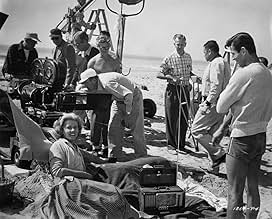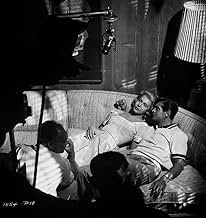To save a man wrongly convicted of murder, Steve Martin reluctantly resumes his relationship with a widow and her son.To save a man wrongly convicted of murder, Steve Martin reluctantly resumes his relationship with a widow and her son.To save a man wrongly convicted of murder, Steve Martin reluctantly resumes his relationship with a widow and her son.
Charles Arnt
- Mr. Appleby - Grocer
- (as Charles E. Arnt)
Russ Bender
- Surgeon
- (uncredited)
Troy Donahue
- Teenager at Beach
- (uncredited)
Tom Greenway
- Coroner
- (uncredited)
Jerry Hartleben
- Boy Playing Football
- (uncredited)
James Seay
- Doctor
- (uncredited)
Robert J. Stevenson
- Policeman on Beach
- (uncredited)
- Director
- Writers
- All cast & crew
- Production, box office & more at IMDbPro
Featured reviews
Bottom-half-of-the-double-bill movies such as this began to die out in the late 1950s as TV anthology shows became the prime source for modest black-and-white dramas. Now, alas, those shows are also a thing of the past and even made-for-TV movies seem to be venturing into this territory with decreasing frequency. All of which gives "Flood Tide" a lost-artifact quality which viewers back in 1958 would not have anticipated or appreciated.
Like many such films, "Flood Tide" begins with a "grabber" -- a man's body is found on a beach -- and then spins out its story in a terse, concentrated manner that avoids detours and subplots. The results may be a bit shallow and simplistic but the movie is never dull and it has the good sense to clock in at a brisk 82 minutes.
Of course, "Flood Tide" is not without its faults. George Nader's patience in dealing with the "Bad Seed" aspects of Michel Ray's character is almost too saint-like to be believed, and his all-too-quick falling in love with Cornell Borchers lacks passion and conviction. And why would he take a crippled boy out in a sailboat without putting a life-vest on him?
Cornell Borchers, who sounds uncannily like Ingrid Bergman, doesn't seem vulnerable enough for this part and George Nader can't quite overcome the unrealistic nature of his part. (However, the movie's only 9-minutes old before he takes his shirt off, revealing a chest which, unlike some of his other appearances, has been shaved and polished.) Michel Ray does well in the rather contrived role of the troubled boy. (Ray's biography on the "imdb" is fascinating!)
Watch for Troy Donahue. He plays the young man who knocks on Cornell Borchers' door to tell her there's a sick boy on the beach.
Some of the film's music was provided by Henry Mancini.
Like many such films, "Flood Tide" begins with a "grabber" -- a man's body is found on a beach -- and then spins out its story in a terse, concentrated manner that avoids detours and subplots. The results may be a bit shallow and simplistic but the movie is never dull and it has the good sense to clock in at a brisk 82 minutes.
Of course, "Flood Tide" is not without its faults. George Nader's patience in dealing with the "Bad Seed" aspects of Michel Ray's character is almost too saint-like to be believed, and his all-too-quick falling in love with Cornell Borchers lacks passion and conviction. And why would he take a crippled boy out in a sailboat without putting a life-vest on him?
Cornell Borchers, who sounds uncannily like Ingrid Bergman, doesn't seem vulnerable enough for this part and George Nader can't quite overcome the unrealistic nature of his part. (However, the movie's only 9-minutes old before he takes his shirt off, revealing a chest which, unlike some of his other appearances, has been shaved and polished.) Michel Ray does well in the rather contrived role of the troubled boy. (Ray's biography on the "imdb" is fascinating!)
Watch for Troy Donahue. He plays the young man who knocks on Cornell Borchers' door to tell her there's a sick boy on the beach.
Some of the film's music was provided by Henry Mancini.
Russ Conway has been convicted of manslaughter on the testimony of Michel Ray. Young Ray has been unable to walk since he was in a car accident that killed his father, so a sympathetic jury believed him unreservedly. George Nader, however, newly returned from South America believes the boy lied. He had begun an affair with the boy's widowed mother, Cornell Borchers, and had wanted to marry her. The mother and son, however, had become so co-dependent, with Ray so sullenly manipulative, that Nader had eventually thrown up his hands. Now he's going to go back and try to get the truth out of the boy, by working on a relationship with him.
The actors are up to their roles, it's an interesting concept, and there's a long flashback sequence to illustrate Nader, Borchers and Ray on the first go-around that stops the movie dead in its tracks for the first third. I find the editing of the matter puzzling; surely, explaining the situation and then showing it makes all dramatic tension go out of the movie. Surely this could have been fixed, by having Nader state his conviction that Ray lied, being asked how he knew, then going into the flashback.
Contemporary audiences stayed away, making this movie a flop and putting an end to Miss Borchers' film career. I'm going to lay the blame on Ted J.Kent's editing. It turns what might have been a slightly brisker, better paced movie into just one of the glossy soaps that Universal cranked out in the late fifties that seemed a lot longer than its nominal 82 minutes.
The actors are up to their roles, it's an interesting concept, and there's a long flashback sequence to illustrate Nader, Borchers and Ray on the first go-around that stops the movie dead in its tracks for the first third. I find the editing of the matter puzzling; surely, explaining the situation and then showing it makes all dramatic tension go out of the movie. Surely this could have been fixed, by having Nader state his conviction that Ray lied, being asked how he knew, then going into the flashback.
Contemporary audiences stayed away, making this movie a flop and putting an end to Miss Borchers' film career. I'm going to lay the blame on Ted J.Kent's editing. It turns what might have been a slightly brisker, better paced movie into just one of the glossy soaps that Universal cranked out in the late fifties that seemed a lot longer than its nominal 82 minutes.
Flood Tide is a very good drama about a man sent to prison on the testimony of a young boy. A friend is sure that the crime never happened the way the boy said it did. A great story, even if parts of it go against common logic. Cornell Borchers' performance reminded me of Ingrid Bergman's sensitivity on film. Well worth seeing.
When the story begins, a young disabled boy claims that he saw a man kill another person. However, Steve Martin (George Nader) isn't convinced of the man's guilt and decides to investigate the case. Hopefully, he can exhonorate the guy who is now up on murder charges.
Steve decides to investigate under cover and arranges an 'accidental' meeting with the boy and his mother. Soon, sparks begin to fly and he and the lady (Cornell Borchers) start to fall in love. However, an interesting thing happens....the boy begins manipulating his mother because he doesn't like Steve and is jealous. And, soon it becomes obvious that the mother does quite a bit to sustain this sick relationship. Can Steve manage to fix this very broken family AND prove the man's innocence?
This is a fascinating and one of a kind film. Nader was great and it's sad when you consider that soon after this his career in Hollywood was cut short when he was outed by the press. He did go to Europe and made some cool spy films, but his American career was essentially over...despite being an excellent actor. As far as Ms. Borchers goes, I think she was only okay in the film...mostly because of her stong accent and only adequate acting. Still, overall, a highly entertaining and fascinating psychological portrait.
Steve decides to investigate under cover and arranges an 'accidental' meeting with the boy and his mother. Soon, sparks begin to fly and he and the lady (Cornell Borchers) start to fall in love. However, an interesting thing happens....the boy begins manipulating his mother because he doesn't like Steve and is jealous. And, soon it becomes obvious that the mother does quite a bit to sustain this sick relationship. Can Steve manage to fix this very broken family AND prove the man's innocence?
This is a fascinating and one of a kind film. Nader was great and it's sad when you consider that soon after this his career in Hollywood was cut short when he was outed by the press. He did go to Europe and made some cool spy films, but his American career was essentially over...despite being an excellent actor. As far as Ms. Borchers goes, I think she was only okay in the film...mostly because of her stong accent and only adequate acting. Still, overall, a highly entertaining and fascinating psychological portrait.
10clanciai
This is a wonderful film, a wonderful story, well acted in perfectly convincing realism and advanced psychology of the very trickiest kind, because it is the story of a crippled boy whose mind is distorted by the tragedy of his life, which has embittered him beyond human recognition; but fortunately one person sees him through and takes him on and makes wonderful job of mental rehabilitation by taking him out in a boat and teaching him to sail. There are few films of this very high psychological calibre, and the one which comes closest to my mind in equally empathic understanding is "Johnny Belinda" 1948 by Jean Negulesco, which is more shocking by all means but all the same presents the same kind of extremely fine human sensitivity. George Nader and Cornell Borchers are both outstandingly excellent, but still the prize goes to the boy Michel Ney, a very serious child of ten years, who really only expresses himself by his eyes, until he is taken out to the sea. There gradually his personality is awakened from the nightmare eternity of disability, making it possible for him to reassess himself and reach maturity. It's a long way to the final conclusion and redemption, but when it finally comes I don't see how any eye could refrain from crying.
Did you know
- TriviaCornell Borchers had played Michel Ray's adoptive mother in Les hommes ne comprendront jamais (1954).
Details
- Release date
- Country of origin
- Language
- Also known as
- Flood Tide
- Filming locations
- Production company
- See more company credits at IMDbPro
- Runtime1 hour 22 minutes
- Color
- Aspect ratio
- 2.35 : 1
Contribute to this page
Suggest an edit or add missing content



































